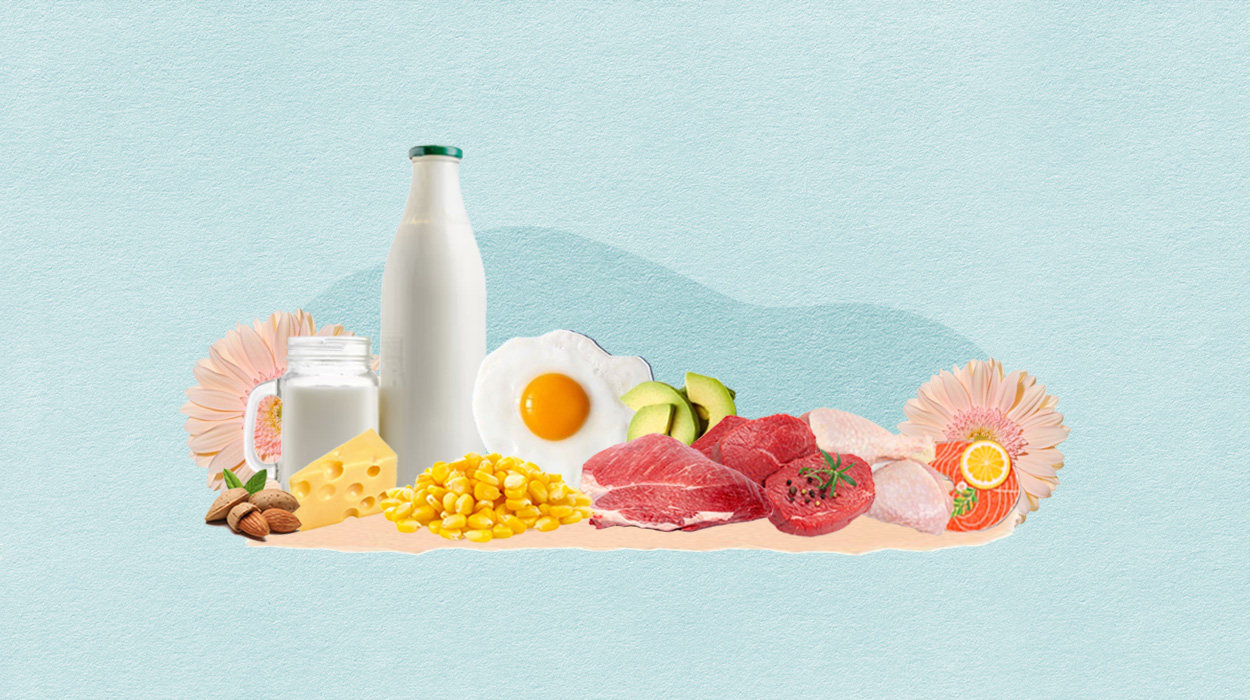Best Foods For Gut Health: 8 Gut-Friendly Foods You Should Eat In 2024
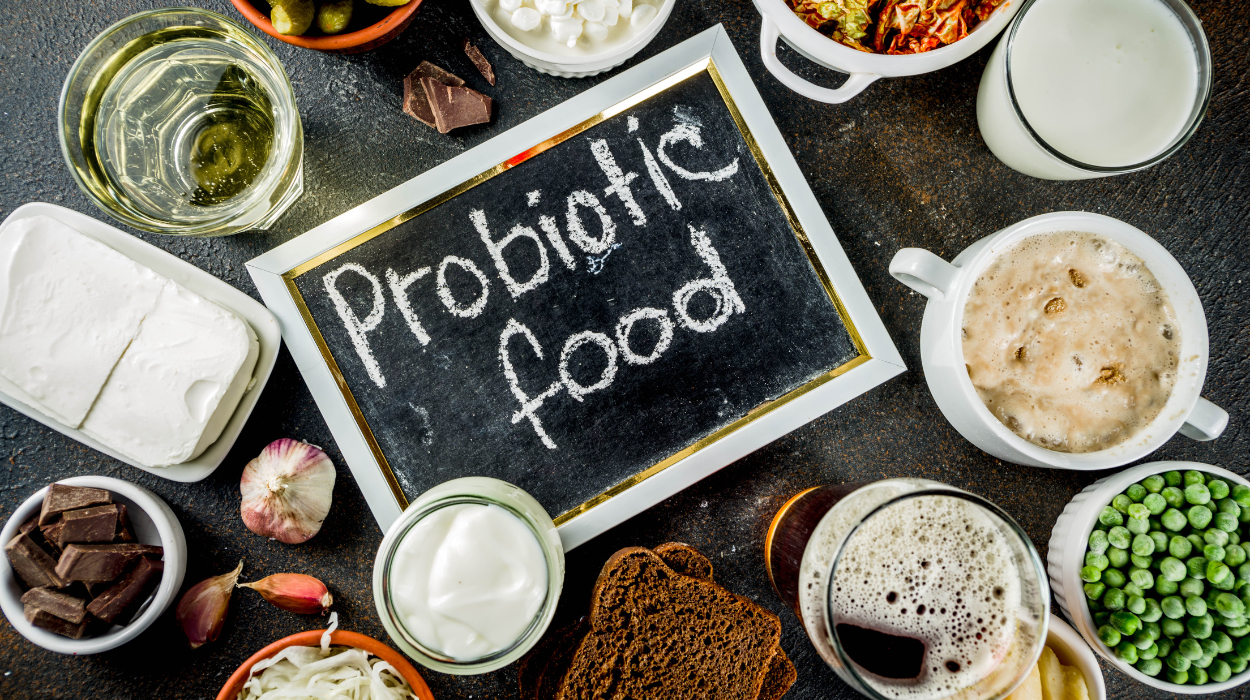
Sometimes, we underestimate the importance of our gut, also known as our digestive system. It is a network of organs that work tirelessly, to break down the foods we consume into nutrients that our body can absorb and utilize. When this system fails, it can cause conditions like irritable bowel syndrome, celiac disease, and peptic ulcer.
Gut health is a holistic measure of the functionality of your digestive system. With the amount of work our gut does, it is important that we take care of it. What better way to do so than eating the best foods for gut health? A balanced diet provides essential nutrients the body needs for good health.
So, here, we list the eight best foods for gut health and digestion. We will also discuss diets that promote your digestive health.
8 Healthy Foods For Your Gut Health
Here are the top 8 foods for gut health:
- Yogurt.
- Kimchi.
- Kefir.
- Miso.
- Salmon.
- Sauerkraut.
- Whole grains.
- Dark green vegetables.
8 Best Foods To Heal Your Gut

Before diving into the list of foods that can promote gut health, it’s essential to understand why we need great foods for gut health. A healthy gut microbiome helps break down and absorb nutrients from our food. Digestion of complex carbohydrates and fiber, ensures that we can efficiently extract the energy and essential compounds we need.
On the other hand, an unhealthy gut can lead to conditions like dysbiosis. Dysbiosis[1] is an imbalance in the gut microbiome, where harmful bacteria outweigh good bacteria. Different factors, such as stress, infection, and lifestyle, may cause dysbiosis.
Dysbiosis often leads to the fermentation of undigested food in the gut. Fermentation produces gas, which can cause you to fart. It also leads to bloating, gastroesophageal reflux disease or GERD, and a host of other conditions. To avoid this, here are eight of the best foods that help with digestion and heal your gut:
Featured Partner Offer
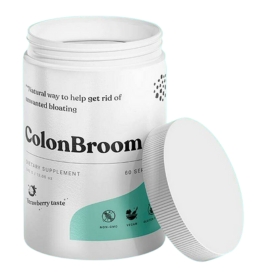
Colon Broom
- Reduces bloating and relieves constipation
- Improves general gut health
- Increases fiber intake
- Supports healthy cholesterol levels
- Promotes healthy circulation
Autumn Sale Up To 65% Off NOW!
Yogurt
We cannot talk about foods good for gut health without mentioning yogurt. It is undoubtedly one of the best foods for gut health. For one, It’s packed with probiotics. Probiotics[2] are beneficial live bacteria that help maintain a healthy gut microbiome. Probiotics in yogurt, such as Lactobacillus strains, create a balanced gut environment by fostering growth of beneficial bacteria while inhibiting harmful ones.
Adding yogurt, one of the best probiotic foods for gut health, to your daily diet offers many benefits[3] to your gut. It improves digestion, fortifies the immune system, and prevents inflammation. In particular, the probiotics in yogurt strengthen the integrity of the gut lining reducing vulnerability to conditions like leaky gut syndrome.[4] It is also one of the foods that help with bloating.
Kimchi
Kimchi is an excellent option for you if you like Korean food. The traditional Korean fermented vegetable dish has a unique tangy flavor and health benefits. It is particularly beneficial for gut health. This probiotic-rich food is made from cabbage and various seasonings, including garlic, ginger, and red pepper flakes.
But why is kimchi one of the best fermented foods for gut health? Kimchi is fermented through a process that involves lactic acid bacteria which are especially beneficial for gut health.[2] The benefits of kimchi to the gut are described in a 2021 study.[5] The beneficial probiotic bacteria help populate the gut with healthy microbes, contributing to a well-balanced gut microbiome.
Also, some studies suggest that kimchi may have anti-inflammatory properties.[6] Chronic inflammation is associated with various digestive conditions like GERD and irritable bowel syndrome. Adding kimchi to your diet is definitely a great option to heal your gut.
Kefir
Kefir is a fermented dairy product[7] crafted from milk using kefir grains. These kefir grains are formed by combining yeast and bacteria with milk. Similar to the probiotics found in yogurt, numerous studies[8] have demonstrated that kefir consumption increases the population of healthy gut bacteria, contributing to improved digestion.
Kefir can enhance digestion by aiding in lactose breakdown, making it a viable option even for those with lactose intolerance. It reduces some of the adverse symptoms of lactose intolerance, such as bloating, cramping, and gas.
Miso
Miso[9] is that flavorful Japanese seasoning we often enjoy in soups and other dishes. But it has more to offer than just its delicious umami taste. It is made by fermenting soybeans with salt and koji, a fungus that is used to make the miso paste.
Its probiotic constituents are central to miso’s appeal for gut health. These probiotics play a crucial role in improving digestion by promoting beneficial gut bacteria. This balance can mitigate digestive issues. Miso is one of those foods that helps with bloating and gas.
Salmon
What is a good diet without fish? Salmon is a key player in promoting gut health while offering a host of additional benefits. One of its standout features is its rich content of omega-3 fatty acids. These fatty acids bring potent anti-inflammatory properties[10] to the table. They aid in the reduction of gut inflammation. Salmon can relieve symptoms and support overall gut health for people dealing with inflammatory bowel diseases like Crohn’s disease and ulcerative colitis.
While salmon itself is not a significant source of dietary fiber, it pairs exceptionally well with fiber-rich foods such as vegetables and whole grains. Creating balanced meals with these combinations can further support healthy digestion.
Sauerkraut
Another one of the good foods for gut health is sauerkraut. Sauerkraut is often associated with traditional Eastern European cuisine and deserves recognition as one of the top contenders among foods that contribute to gut health.
This fermented cabbage dish owes its gut-friendly reputation to its remarkable fermentation process, which involves lactic acid bacteria. This is similar to those found in yogurt and kefir. As a result, sauerkraut is a rich source of probiotics.[11]
Sauerkraut’s contribution to digestive health goes beyond its probiotic content. The dietary fiber in sauerkraut sustains the beneficial bacteria in your gut. This fiber not only aids in nourishing these microbes but also supports regular bowel movements and contributes to the overall well-being of your digestive system.
Whole Grains
Whole grains are an important part of a health-conscious diet. They are already a large part of our everyday diet, so it is even better that they are helpful to your gut. These grains include oats, brown rice, quinoa, and whole wheat.
Dietary fiber is a standout feature of whole grains, and it plays a pivotal role in promoting regular bowel movements. Fiber aids in sweeping waste and toxins from the colon, mitigating the risk of constipation and other digestive discomforts.
Certain whole grains, such as oats and barley, go the extra mile as they contain prebiotics. Prebiotics are non-digestible fibers that selectively fuel the growth and activity of good gut bacteria. This dynamic interaction promotes equilibrium within the gut microbiome, supporting overall digestive well-being.
The advantages of whole grains extend beyond mere digestive health. Thanks to their fiber content, they offer protection against conditions like diverticulitis. Furthermore, whole grains are associated with a reduced risk of colon cancer, which is attributed to their fiber and phytochemical content.
Last, whole grains have a lower glycemic index than their refined counterparts, leading to a gradual and controlled rise in blood sugar levels. This blood sugar regulation can reduce the risk of type 2 diabetes. So today, try whole grains, such as brown rice, whole wheat bread, quinoa, and oats.
Green Vegetables
If you are having issues with digestion, maybe you need more greens. Vegetables are one of the best foods that help with digestion. There are numerous options, including spinach, kale, broccoli, and asparagus, each offering a wealth of benefits for the gut system.
Green vegetables are excellent sources of dietary fiber.[12] The presence of fiber adds thickness to stool, facilitating its smooth passage through the digestive tract.[13] Certain green vegetables, such as spinach and kale, have digestive enzymes that break down food and support efficient digestion.
Whether served as a side dish, incorporated into a salad, blended into a smoothie, or featured in a stir-fry, green vegetables offer versatility and nutritional richness, making them a great addition to your gut-healing diet.
Different Types Of Diets That May Help With Gut Health
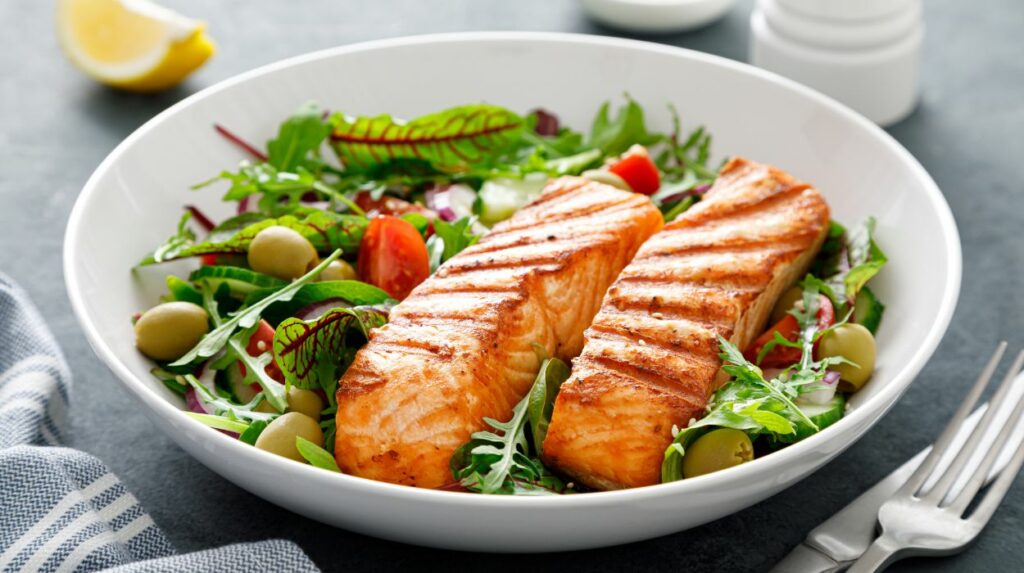
If you are ready to improve your gut health, you might want to revamp your entire diet. There are several types of diets that have been associated with better gut health. There are also options like a trusty debloat pill, but these work best when supported by diet.
The effectiveness of these diets may vary from person to person. So, we recommend consulting with a dietitian before making significant dietary changes.
Here are some popular diets that may help with gut health:
Mediterranean Diet
The Mediterranean diet[14] emphasizes fruits, vegetables, whole grains, legumes, nuts, seeds, and olive oil. It includes moderate amounts of fish, poultry, and dairy while limiting red meat and processed foods. This diet is rich in fiber, antioxidants, and healthy fats, which can promote gut health and reduce inflammation.
Plant-Based Diet
A plant-based diet[15] is also known as a vegan diet. This high fiber diet can increase the diversity of gut bacteria and provide a wide range of nutrients. Simply put, they are the best foods to eat for gut health. However, it is advised to add extra vitamins for gut health. Ensuring adequate intake of essential nutrients like vitamin B12, iron, and protein is recommended for people on a vegan diet.
Low-FODMAP Diet
The low-FODMAP diet is often recommended for people with irritable bowel syndrome. FODMAPs[16] are fermentable carbohydrates that can trigger digestive symptoms in some people. This diet restricts high-FODMAP foods and gradually reintroduces them to identify specific triggers.
GAPS (Gut And Psychology Syndrome) Diet
The GAPS[17] diet is gut-focused. It is designed to improve gut health and address conditions such as autism, ADHD, and depression. Its name derives from the gut-brain connection. The GAPS diet eliminates processed foods, grains, and sugars while promoting bone broth, fermented foods, and probiotics. These are also foods best for gut health.
The Bottom Line
Do you want to invest in your health? Then, prioritize gut health through your dietary choices. We’ve explored eight of the best foods for gut health, including yogurt, kefir, and kimchi. These foods provide essential probiotics, prebiotics, and nutrients to help nurture and improve your gut ecosystem.
However, remember that there’s no one-size-fits-all approach to gut health. What works best for you might differ from someone else’s needs. Listen to your body, stay hydrated, and maintain a well-balanced diet to support your gut health journey.
Frequently Asked Questions
Include probiotic-rich foods like yogurt, kefir, and fermented vegetables in your daily diet. Consume high-fiber foods such as fruits, vegetables, and whole grains. Stay hydrated, and minimize processed and sugary foods.
Focus on a diet rich in fiber and fermented foods. Stay hydrated, manage stress, exercise regularly, and avoid excessive use of antibiotics. Probiotic supplements may also help, but consult a healthcare professional for guidance.
Healing the gut typically takes time, but you can start by eliminating processed foods, sugars, and artificial additives. Instead, eat probiotics and prebiotics, and consult a healthcare professional for personalized advice.
Foods like yogurt, kefir, sauerkraut, kimchi, miso, and high-fiber options like oats and legumes support a healthy gut microbiome by providing probiotics and prebiotics.
Foods aiding gut healing include bone broth, collagen-rich foods, soothing herbal teas, and easily digestible options like cooked vegetables and lean proteins. Focus on anti-inflammatory choices because they are soothing.
Signs of an unhealthy gut may include bloating, gas, constipation, diarrhea, food intolerances, fatigue, mood swings, and skin issues. Consult a healthcare professional for an accurate diagnosis and treatment.
Resources
- Gisela Adrienne Weiss and Thierry Hennet (2017). Mechanisms and consequences of intestinal dysbiosis. Cellular and Molecular Life Sciences, [online] 74(16), pp.2959–2977. doi:https://doi.org/10.1007/s00018-017-2509-x.
- Kechagia, M., Dimitrios Basoulis, Stavroula Konstantopoulou, Dimitra Dimitriadi, Konstantina Gyftopoulou, Nikoletta Skarmoutsou and Eleni Maria Fakiri (2013). Health Benefits of Probiotics: A Review. ISRN Nutrition, [online] 2013, pp.1–7. doi:https://doi.org/10.5402/2013/481651.
- Savaiano, D.A. and Hutkins, R.W. (2020). Yogurt, cultured fermented milk, and health: a systematic review. Nutrition Reviews, [online] 79(5), pp.599–614. doi:https://doi.org/10.1093/nutrit/nuaa013.
- Camilleri, M. (2019). Leaky gut: mechanisms, measurement and clinical implications in humans. Gut, [online] 68(8), pp.1516–1526. doi:https://doi.org/10.1136/gutjnl-2019-318427.
- Wastyk, H.C., Fragiadakis, G.K., Perelman, D., Dahan, D., Merrill, B.D., Feiqiao Brian Yu, Topf, M., Carlos Gutiérrez González, William Van Treuren, Han, S., Robinson, J.L., Elias, J.E., Sonnenburg, E.D., Gardner, C.D. and Sonnenburg, J.L. (2021). Gut-microbiota-targeted diets modulate human immune status. Cell, [online] 184(16), pp.4137-4153.e14. doi:https://doi.org/10.1016/j.cell.2021.06.019.
- Le, B. and Ngoc, T. (2020). Enhancement of the Anti-Inflammatory Effect of Mustard Kimchi on RAW 264.7 Macrophages by the Lactobacillus plantarum Fermentation-Mediated Generation of Phenolic Compound Derivatives. Foods, [online] 9(2), pp.181–181. doi:https://doi.org/10.3390/foods9020181.
- Damiana Diniz Rosa, Maciel, M., Łukasz Grześkowiak, Aparecida, S., Lopes, L. and Maria (2017). Milk kefir: nutritional, microbiological and health benefits. Nutrition Research Reviews, [online] 30(1), pp.82–96. doi:https://doi.org/10.1017/s0954422416000275.
- Benjamin, Willing, B.P. and Cotter, P.D. (2016). The Microbiota and Health Promoting Characteristics of the Fermented Beverage Kefir. Frontiers in Microbiology, [online] 7. doi:https://doi.org/10.3389/fmicb.2016.00647.
- Swain, M.R., Marimuthu Anandharaj, Ray, R.C. and Rizwana Parveen Rani (2014). Fermented Fruits and Vegetables of Asia: A Potential Source of Probiotics. Biotechnology Research International, [online] 2014, pp.1–19. doi:https://doi.org/10.1155/2014/250424.
- Bozzi, D., Jacob Agerbo Rasmussen, Carøe, C., Harald Sveier, Nordøy, K., Gilbert, T.P. and Limborg, M.T. (2021). Salmon gut microbiota correlates with disease infection status: potential for monitoring health in farmed animals. Animal Microbiome, [online] 3(1). doi:https://doi.org/10.1186/s42523-021-00096-2.
- Gaudioso, G., Weil, T., Marzorati, G., Solovyev, P.A., Bontempo, L., Franciosi, E., Bertoldi, L., Pedrolli, C., Tuohy, K. and Fava, F. (2022). Microbial and metabolic characterization of organic artisanal sauerkraut fermentation and study of gut health-promoting properties of sauerkraut brine. Frontiers in Microbiology, [online] 13. doi:https://doi.org/10.3389/fmicb.2022.929738.
- Gill, S., Rossi, M., Balázs Bajka and Whelan, K. (2020). Dietary fibre in gastrointestinal health and disease. Nature Reviews Gastroenterology & Hepatology, [online] 18(2), pp.101–116. doi:https://doi.org/10.1038/s41575-020-00375-4.
- Barber, T.M., Kabisch, S., Andreas and Weickert, M.O. (2020). The Health Benefits of Dietary Fibre. Nutrients, [online] 12(10), pp.3209–3209. doi:https://doi.org/10.3390/nu12103209.
- Guasch‐Ferré, M. and Willett, W.C. (2021). The Mediterranean diet and health: a comprehensive overview. Journal of Internal Medicine, [online] 290(3), pp.549–566. doi:https://doi.org/10.1111/joim.13333.
- Medawar, E., Hühn, S., Arno Villringer and A. Veronica Witte (2019). The effects of plant-based diets on the body and the brain: a systematic review. Translational Psychiatry, [online] 9(1). doi:https://doi.org/10.1038/s41398-019-0552-0.
- Bellini, M., Tonarelli, S., Nagy, A.G., Pancetti, A., Costa, F., Ricchiuti, A., Nicola de Bortoli, Mosca, M., Marchi, S. and Rossi, A. (2020). Low FODMAP Diet: Evidence, Doubts, and Hopes. Nutrients, [online] 12(1), pp.148–148. doi:https://doi.org/10.3390/nu12010148.
- Proquest.com. (2021). Specific Carbohydrate Diet (SCD/GAPS) and Dietary Supplements for Children with Autistic Spectrum Disorder – ProQuest. [online] Available at: https://www.proquest.com/openview/a2b7287e047bc5ed06561166fa65a69d/1?pq-origsite=gscholar&cbl=2026619.
More from Digestion
-
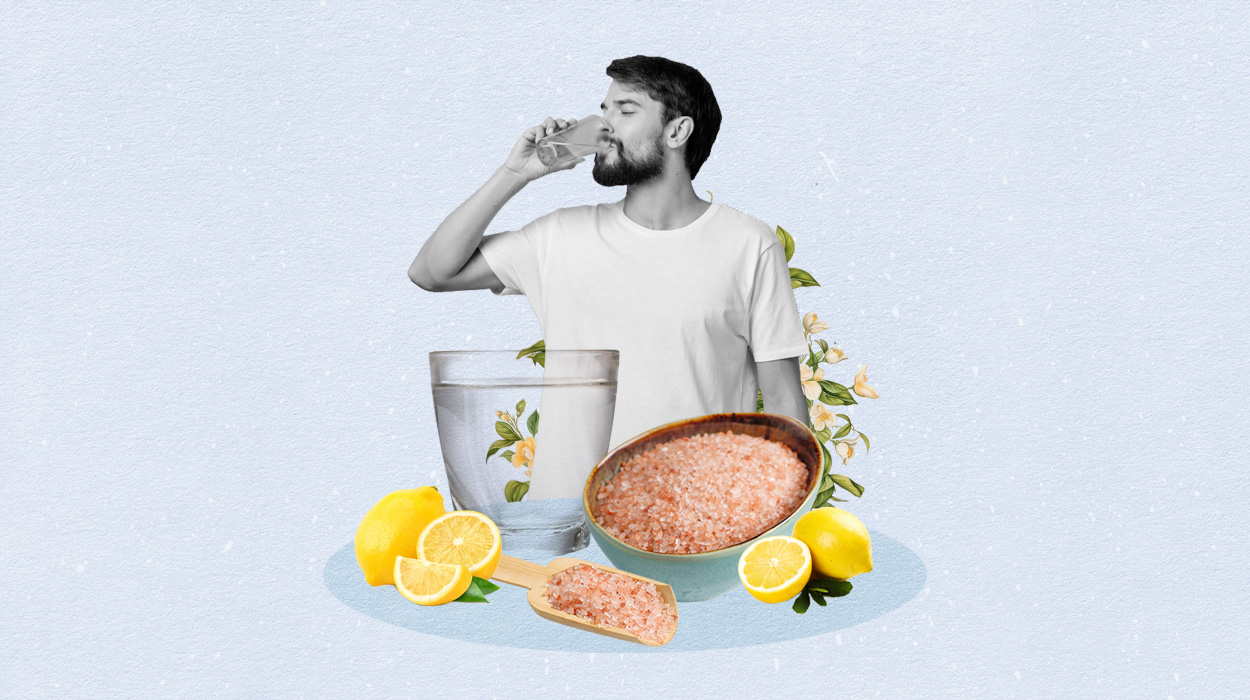
Salt Water Colon Cleanse: Benefits, How To Do It & More In 2024
Jill Levy, Health & Nutrition Writer
May 02, 2024
A salt water colon cleanse involves drinking a solution made with salt/sodium dissolved in water to clean out the bowels and…Read more -

10 Best Foods For Gut Health And Weight Loss In 2024 – Health Expert’s Recommendations
May 02, 2024
Recently, alterations in the gut[1] have gained attention as a potential factor contributor to diseases[2] like irritable bowel syndrome, also known…Read more -
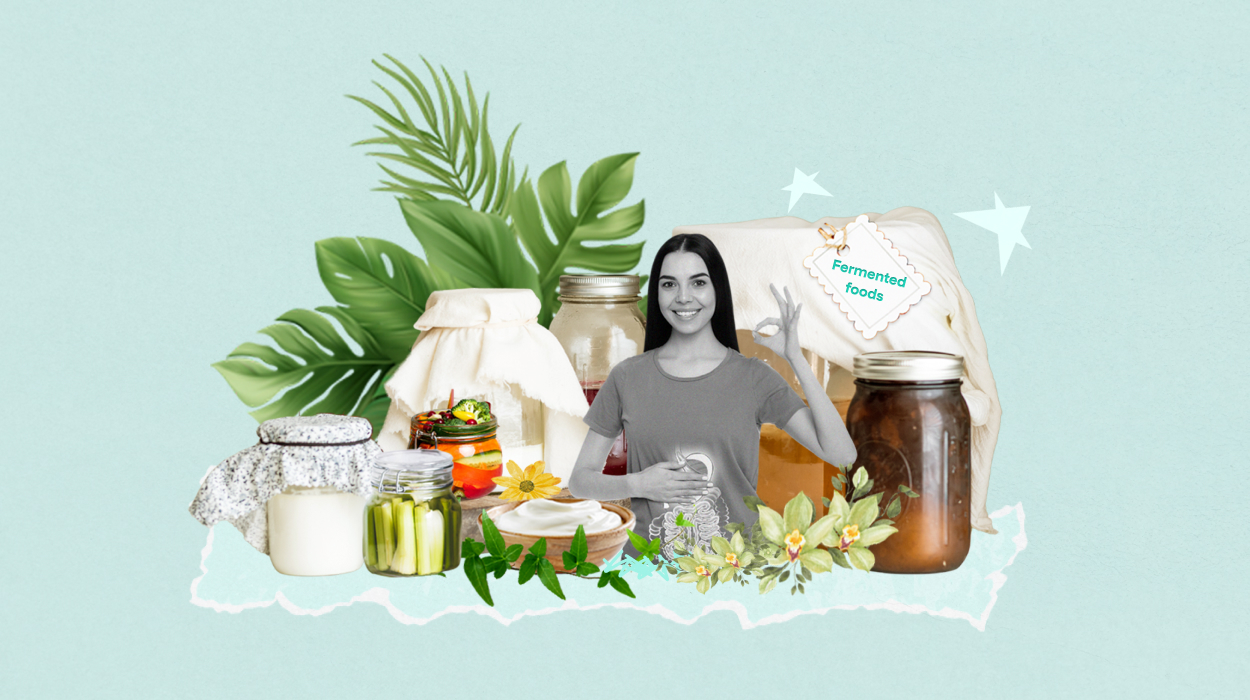
Fermented Foods For Gut Health – 8 Best Fermented Foods That Are Beneficial For Your Gut In 2024
January 16, 2024
Fermentation sounds like some fancy culinary technique, but it’s pretty common. Think about bread, cheese, beer, and even pickles—all are fermentation…Read more -

Gut Health And Anxiety 2024: Is There A Connection Between The Two?
January 13, 2024
Ever get that fluttery feeling in your stomach when you’re anxious? It turns out that your gut and brain have a…Read more




